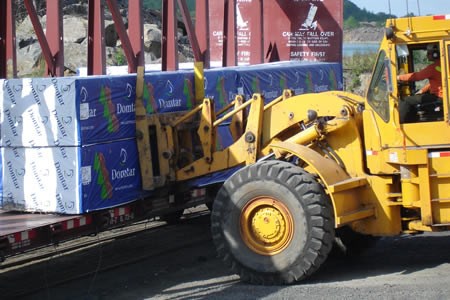Continuous improvements at Sudbury’s Sea Rail Transloading Inc. have allowed its railcar traffic to triple over the last two years, according to general manager Mike Linseman.
“It’s going really well and we’re fielding more inquiries every day.”
The logistics company, a division of Mansour Group of Companies, has a two-kilometre private line connecting to the nearby Canadian Pacific Rail (CP) main line. Nearly 780 cars were handled through the past year, compared against the 500 cars the year before, and the 220 cars the previous year. The capacity for the line is 2,000 cars. Right now, business is running at 40 per cent capacity, plenty of room for future growth, he says.
The private line or rail spur leading into the 20,000-square-foot warehousing space and unloading facility has helped. Additional storage space is being constructed as the company blasts nearby rock clusters, carving more room out of the nearly 50 acres of their private land.
Despite its short-term successes, Mansour Group vice-president Gilles Lebeau believes more can be done. Many service and supply companies often have long-standing relationships with their shippers, making it difficult to convince some to change, he says.
“They’re not great strides," says Lebeau.
“We’re asking people to make a significant change in how they do business, and that takes time.”
Still, the escalating price of fuel is providing incentives for companies to look for ways to cut costs, making Mansour’s recent investment a timely one.
A quick tour through the yard shows evidence of this interest. Cars loaded with chemicals and products for the mining sector, including soda ash for Vale Inco, and stacks of lumber shipments from forestry giant Domtar are awaiting transport. Previously, the wood was sent to Buffalo via truck and then shipped to its various markets. Materials being transported from the rail yard to other local sites have given an extra boost to local truckers, he says.
The line is also feeding into several of the Mansour Group’s other plans. Internal goods and services, such as Diesel Electric’s recently purchased nine locomotives, can be handled through the spur line and warehouse.
While hesitant to discuss the company’s many plans, he says the company has acquired the local former Neelon Casting foundry. The facility, which staffed 200, shut down in 2007 and has its own spur line to the Canadian National (CN) rail line.
Details surrounding the new facility are intentionally vague, except that it is currently in the investment stages and officials are attempting to develop it into a viable long-term business.
“When you’re in a business like this, you’re able to look at other opportunities in a different light,” Lebeau says. “You’re able to look at an old foundry that nobody wants and see that there’s a rail coming in there, and the business that we’re in means we can do something with that.”




